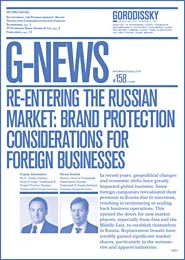Russia: “Accidental” Online Databases
30 August 2021We often encounter databases on the internet that were filled in by users and the creation of which was not the main purpose of the owner. Moreover, we often voluntarily contribute to creating such databases by creating our accounts on Facebook or similar services and uploading our personal information as well as information about our preferences.
We can also upload the information about the property we would like to sell on the respective free-of-charge services.
By doing this we participate in the creation of the respective databases that can be of interest to various companies. For instance, banks may be willing to know the market price of a used car for the purpose of evaluating the pledged property.
Other company would like to collect and analyse information collected in such databases to effectively market their products. In such cases online databases are considered as valuable and easy-to-access source of information already arranged in the way the computer can process it. Moreover, some software developers create special software making it easier to search and extract necessary data from databases available online.
All these circumstances may trigger a conflict between the companies that arranged creation of such databases and companies willing to use them for free. This conflict needs to be decided by court to answer the question whether or not such accidental online databases enjoy protection provided by the IP law.
This article considers the recent court’s reasoning delivered in the case initiated by the owner of the Russian network service – VKontakte (hereinafter - VK). In this case VK claimed that the database of VK users qualifies to be protected by the neighboring right law.
Online databases created by users
Databases are protected in Russia by copyright and neighboring rights law. If in the first case the law protects creativity of the database, in case of the neighboring rights law the investment made for creation of a database is protected. This article is limited to protection of databased in terms of neighboring rights law.
Under the Russian law a database needs to meet the following criteria to enjoy protection by the IP law:
1. The database should exist in objective form and consist of separate items (for instance, research papers, pieces of legislation, court decisions,etc.);
2. The data should be arranged in the way available for search and processing by computer. Therefore, databases existing in non-electronic form do not enjoy the neighbouring rights protection;
3. The database should meet the standard of the significant investments. The investmentsare presumed significant if the database consists of 10,000 or more separate items/material.
The following questions were raised before the court in a VK case:
1. Whether or not the fact of filling in the database by users rather than by its owner prevents the database from enjoying protection under the neighbouring right law;
2. Whether or not the fact that creation of the VK database was not the principal purpose of the VK administrator’s investments should prevent the database from enjoying protection under the neighbouring right law.
The IP Court acting as the court of cassation answered the questions by delivering its ruling on the cassation appeal brought against the judgement of the lower court.
Reasoning provided by the IP Court in this that case is applicable to all similar cases where an online database is filled in by users rather than by its administrator.
In that case, VK brought a lawsuit against the developer of the software who, according to the plaintiff, used the database of VK’s users without VK’s consent. VK argued that it holds the exclusive right to the database of all VK’s users and this database enjoys protection provided by the neighbouring rights law.
The key arguments of the defendant were that the plaintiff has no IP rights to the VK database as it was mostly created by users rather than the administrator whose principal purpose was/is to make the social network web-site rather than the database of users’ data. Therefore, the plaintiff did not and does not have the purpose to invest into creation of the VK database that was a kind of by-product of VK’s main business.
The court does not agree with the defendant’s reasoning and points out that the law does not require the owner of the database to prove that the owner had intention to create the database in terms of the neighbouring rights law when investingits funds and efforts.
Therefore, the criterion of purpose of the investment is not applicable to databases. The owner of the database should prove that the investments made into the database are significant.
In the VK case the investments into the creation of the database were presumed significant as the said database consists of much more than 10,000 separate materials. At the same time, the defendant failed to submit sound proof capable to overcome the presumption of VK’s significant investments.
The court also rejects the defendant’s argument that the VK database were filled in by users rather than by the owner of the database.
The court reasons (i) that the law does not oblige the owner of the database to fill in the database on its own; (ii) that VK’s arranging creation of the database, processing, systematising and storing data uploaded by users evidences that the database has been created by VK and, therefore, this database enjoys protection granted by the IP law .
Summary
The outcome of the VK case is that the protection of the databases created by their owners is extended to so called accidental online databases mostly created by users. Therefore, the use of such databases requires the consent of their owners and may entail responsibility in the event of their unauthorised use.










